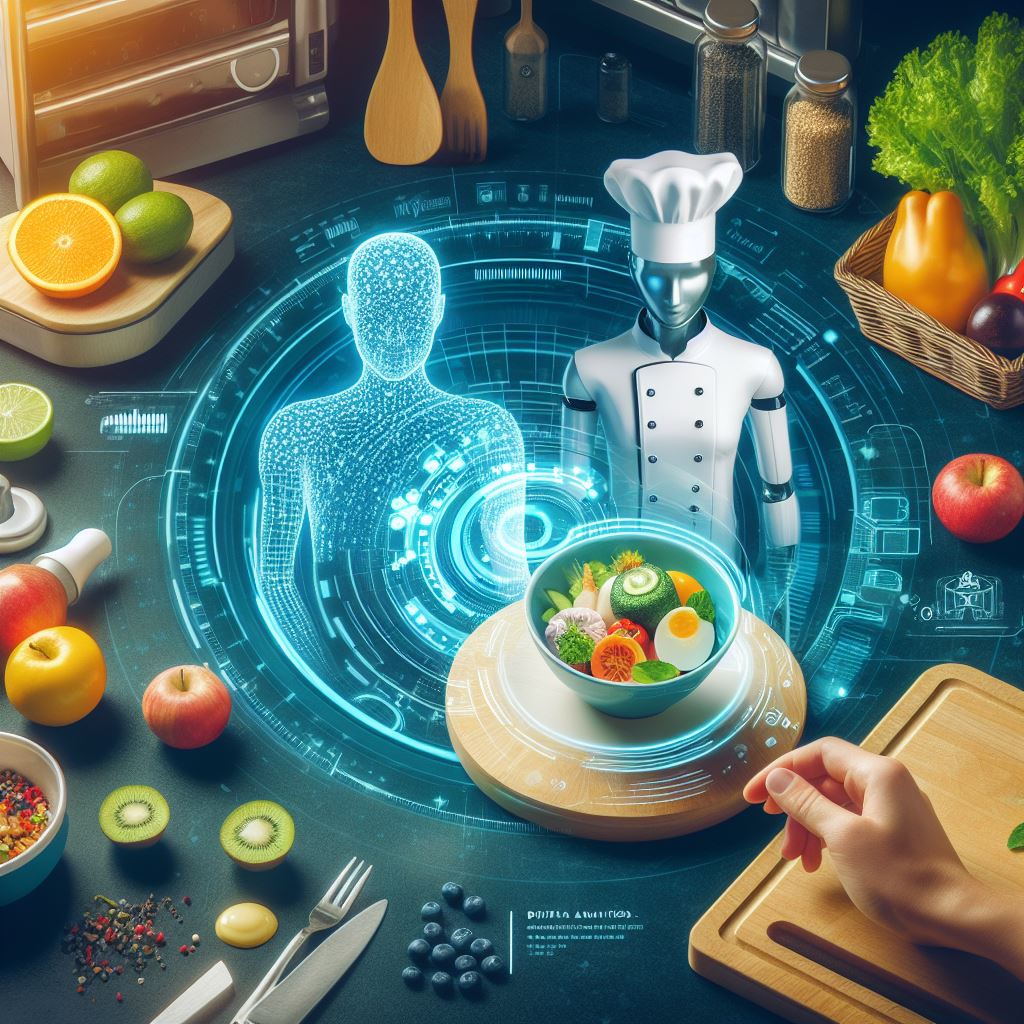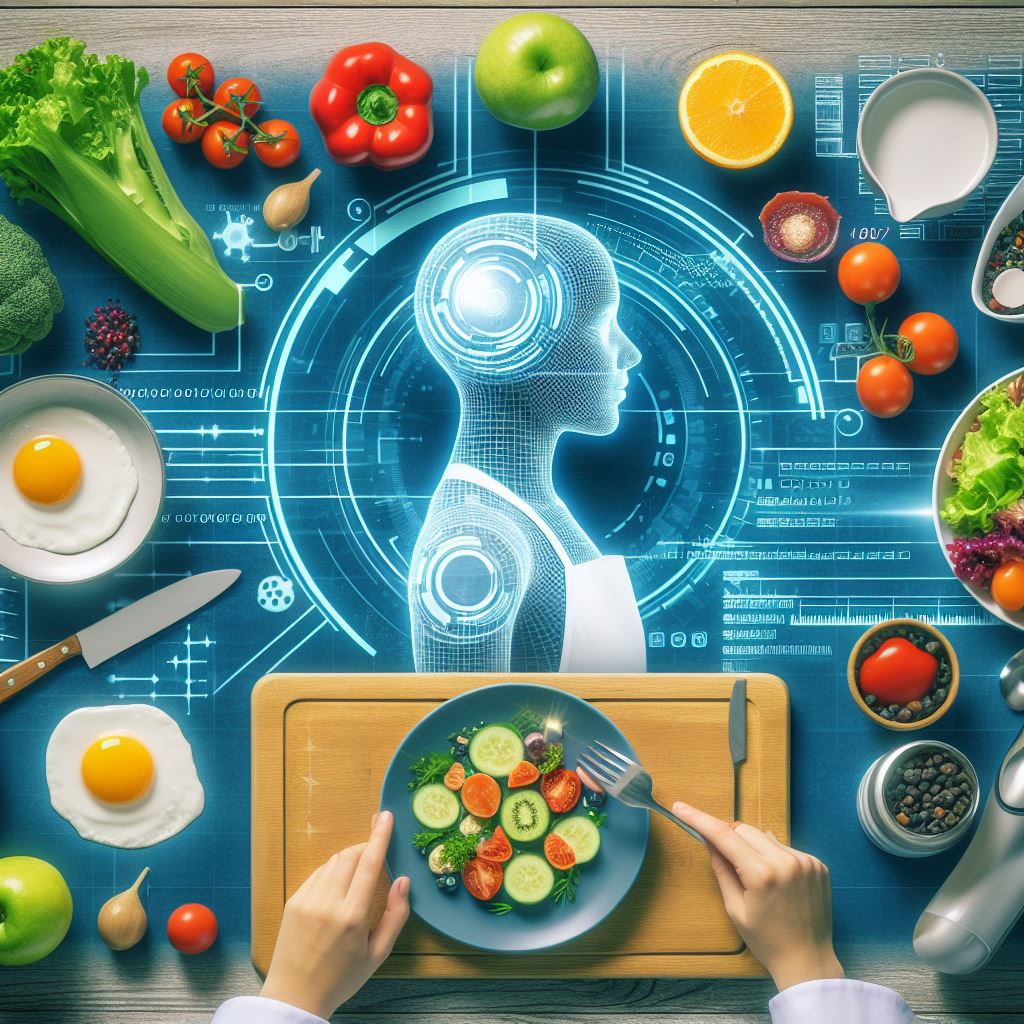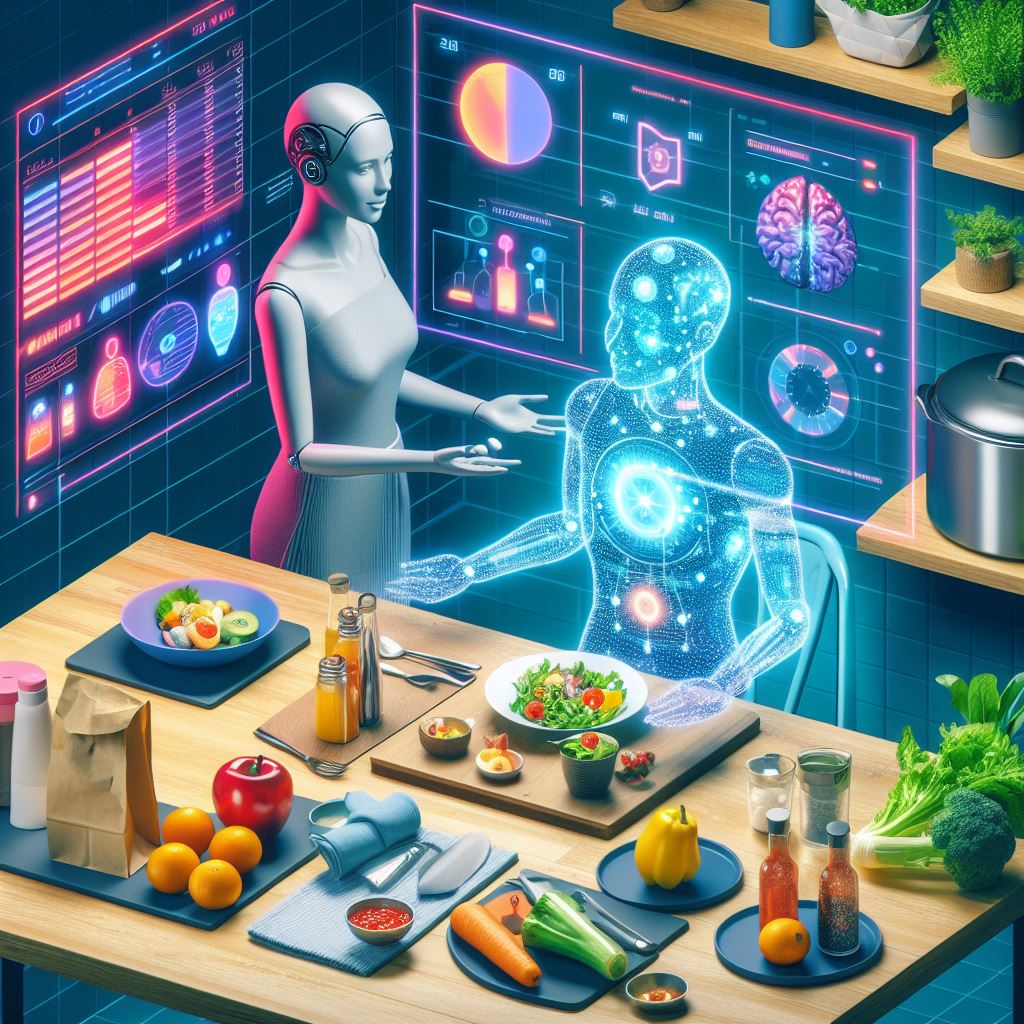Introduction
Diet is one of the most important factors in maintaining health and wellness. What we eat affects not only our physical health, but also our mental and emotional well-being. However, finding the optimal diet for ourselves can be challenging, as there is no one-size-fits-all solution. Different people have different needs, preferences, and goals when it comes to nutrition.

This is where AI chefs come in. AI chefs are artificial intelligence systems that can design personalized diets for individuals based on their data and feedback. AI chefs use advanced algorithms to analyze various factors such as medical history, dietary preferences, nutritional needs, and health goals, and then create customized meal plans and recipes that suit each person’s unique profile. AI chefs can also learn from the user’s behavior and preferences over time and adjust their recommendations accordingly.
In this article, we will explore the potential of AI-driven dietary recommendations for optimizing health and performance. We will discuss the significance of personalized diets, the role of AI in culinary innovation, how AI chefs work, the benefits and challenges of AI-driven dietary advice, and the future of AI chefs in the food industry and consumer behavior.
The Significance of Personalized Diets
One of the limitations of conventional dietary recommendations is that they are often based on general guidelines and averages, rather than individual differences. For example, the recommended daily intake of calories, macronutrients, and micronutrients may vary depending on factors such as age, gender, weight, height, activity level, and health conditions. Moreover, people have different tastes, preferences, allergies, intolerances, and cultural backgrounds that influence their food choices.

Personalized diets, on the other hand, take into account these individual variations and tailor the dietary advice to each person’s specific needs and goals. Personalized diets can help people achieve optimal health and performance by providing them with the right amount and type of nutrients, as well as satisfying their taste buds and preferences. Personalized diets can also have a positive impact on the physical and mental well-being of individuals, as they can improve their energy levels, mood, cognition, immunity, and overall quality of life.
Introduction to AI in Culinary Innovation
AI chefs are a form of AI in culinary innovation, which is the application of artificial intelligence to the field of food and cooking. AI in culinary innovation can be used for various purposes, such as creating new recipes, analyzing food composition, optimizing food production, enhancing food quality, and improving food safety.
AI chefs are specifically focused on designing personalized diets for individuals, using various AI algorithms and techniques. Some of the AI algorithms used in culinary applications include natural language processing, computer vision, machine learning, deep learning, and reinforcement learning. These algorithms enable AI chefs to understand natural language inputs, recognize and process images, learn from data and feedback, generate novel and creative outputs, and optimize their performance.
Some examples of AI-driven platforms and technologies in the food industry are:
- Suggestic: A mobile app that uses AI to create personalized meal plans and recipes based on the user’s health goals, preferences, and biometric data. The app also provides nutritional information, grocery lists, and restaurant recommendations.
- PlantJammer: A web platform that uses AI to generate plant-based recipes based on the user’s ingredients, preferences, and dietary needs. The platform also provides tips and tricks on how to cook with plant-based ingredients, and allows users to share their recipes with the community.
- Gastrograph AI: A software that uses AI to analyze and predict consumer preferences and behavior for food and beverage products. The software helps food and beverage companies create and optimize products that appeal to their target markets, and provides insights on consumer trends and preferences.
- Chef Watson: A cognitive cooking system that uses AI to create new and innovative recipes based on the user’s input of ingredients, cuisine, and dish type. The system also provides nutritional information, cooking instructions, and flavor profiles.
How AI Chefs Work
The process of designing personalized diets using AI chefs can be summarized as follows:
- Data collection: The first step is to collect data from the user, such as their medical history, dietary preferences, nutritional needs, health goals, and feedback. This data can be obtained through various sources, such as online surveys, mobile apps, wearable devices, biometric sensors, and social media.
- Data analysis: The next step is to analyze the data using AI algorithms, such as natural language processing, computer vision, and machine learning. The analysis can reveal patterns, trends, and insights about the user’s profile, such as their calorie intake, nutrient deficiencies, food preferences, and eating habits.
- Data synthesis: The third step is to synthesize the data and generate personalized dietary recommendations, such as meal plans, recipes, and nutritional advice. The synthesis can be done using AI algorithms, such as deep learning, generative adversarial networks, and reinforcement learning. The synthesis can also take into account factors such as seasonality, availability, affordability, and sustainability of food.
- Data feedback: The final step is to provide feedback to the user and the AI system, such as the user’s satisfaction, adherence, and outcomes. The feedback can be used to evaluate the effectiveness and accuracy of the dietary recommendations, and to improve and refine them over time.
Optimizing Health and Performance
AI chefs can help individuals achieve peak performance through personalized diets, by providing them with the optimal nutrition for their specific needs and goals. AI chefs can also help individuals manage chronic conditions and promote overall health, by providing them with the appropriate dietary interventions and guidance.
Some examples of how AI-driven dietary recommendations can optimize health and performance are:
- Athletes: AI chefs can help athletes improve their physical performance, recovery, and injury prevention, by providing them with personalized diets that match their training, competition, and recovery phases. AI chefs can also help athletes optimize their body composition, hydration, and electrolyte balance, by providing them with the right amount and type of calories, macronutrients, and micronutrients.
- Patients: AI chefs can help patients manage their chronic conditions, such as diabetes, hypertension, and obesity, by providing them with personalized diets that suit their medical needs and prescriptions. AI chefs can also help patients prevent or delay the onset of diseases, such as cardiovascular disease, cancer, and dementia, by providing them with personalized diets that reduce the risk factors and promote the protective factors.
- Professionals: AI chefs can help professionals enhance their mental performance, productivity, and creativity, by providing them with personalized diets that support their cognitive functions, such as memory, attention, and problem-solving. AI chefs can also help professionals improve their mood, stress, and sleep quality, by providing them with personalized diets that balance their hormones, neurotransmitters, and circadian rhythms.
Some case studies showcasing successful outcomes with AI-designed diets are:
- Suggestic: A study conducted by Suggestic and Stanford University showed that users who followed the AI-generated personalized meal plans had significant improvements in their blood glucose levels, weight loss, and metabolic health, compared to users who followed standard dietary guidelines.
- PlantJammer: A study conducted by PlantJammer and Copenhagen Business School showed that users who used the AI-generated plant-based recipes had increased their consumption of fruits and vegetables, reduced their environmental impact, and improved their cooking skills and confidence, compared to users who did not use the platform.
- Gastrograph AI: A study conducted by Gastrograph AI and PepsiCo showed that the AI-generated flavor profiles and product formulations had increased the consumer acceptance and preference of the products, compared to the conventional methods of product development.
Addressing Challenges and Concerns
AI-driven dietary recommendations are not without challenges and concerns, especially in terms of ethics, bias, and privacy. These issues need to be addressed and resolved, in order to ensure the trustworthiness and reliability of AI chefs.
Some of the challenges and concerns related to AI-driven dietary recommendations are:
- Ethics: AI chefs need to adhere to ethical principles and standards, such as fairness, transparency, accountability, and human dignity, when designing personalized diets for individuals. AI chefs need to respect the user’s autonomy, preferences, and values, and avoid imposing or influencing their choices. AI chefs also need to ensure the safety, quality, and sustainability of the food they recommend, and avoid causing any harm or damage to the user, the environment, or the society.
- Bias: AI chefs need to avoid bias and discrimination, such as racial, gender, or cultural bias, when designing personalized diets for individuals. AI chefs need to ensure that their algorithms and data are representative, inclusive, and diverse, and that they do not reinforce or perpetuate any stereotypes or prejudices. AI chefs also need to acknowledge and correct any errors or inaccuracies in their recommendations, and provide explanations and justifications for their decisions.
- Privacy: AI chefs need to protect the privacy and security of the user’s personal health data, such as their medical history, dietary preferences, and biometric data, when designing personalized diets for individuals. AI chefs need to obtain the user’s consent, permission, and control over their data, and ensure that their data are encrypted, anonymized, and stored securely. AI chefs also need to comply with the relevant laws and regulations, such as the General Data Protection Regulation (GDPR), and respect the user’s rights and interests.
The Future of AI Chefs
AI chefs are expected to become more prevalent and influential in the future, as they continue to improve and innovate in the field of personalized nutrition. AI chefs are likely to create new opportunities and challenges for the food industry and consumer behavior, as they change the way people eat and cook.
Some of the predictions for the future of AI-driven culinary innovation are:
- Personalized food delivery: AI chefs may partner with food delivery services, such as Uber Eats or Deliveroo, to provide personalized food options for users based on their location, time, and preferences. Users may be able to order food from AI-generated menus, or request custom-made dishes that suit their dietary needs and goals.
- Smart kitchen appliances: AI chefs may integrate with smart kitchen appliances, such as refrigerators, ovens, or microwaves, to create personalized meals for users at home. Users may be able to scan their ingredients, select their recipes, and cook their meals with the help of AI-guided instructions and feedback.
- Virtual reality and augmented reality: AI chefs may use virtual reality and augmented reality technologies, such as headsets, glasses, or gloves, to create immersive and interactive experiences for users in the culinary domain. Users may be able to explore new cuisines, cultures, and flavors, or learn new cooking skills and techniques, with the help of AI-generated simulations and enhancements.
- Social media and online communities: AI chefs may leverage social media and online communities, such as Facebook, Instagram, or Reddit, to create and share personalized content and information for users in the food domain. Users may be able to access AI-generated tips, reviews, and recommendations, or interact with other users and experts, with the help of AI-mediated communication and collaboration.
Conclusion
AI chefs are a revolutionary innovation in the field of personalized nutrition, as they can design personalized diets for individuals based on their data and feedback. AI chefs can help individuals optimize their health and performance, by providing them with the optimal nutrition for their specific needs and goals. AI chefs can also help individuals manage their chronic conditions and promote their overall health, by providing them with the appropriate dietary interventions and guidance.
However, AI chefs also pose some challenges and concerns, especially in terms of ethics, bias, and privacy. These issues need to be addressed and resolved, in order to ensure the trustworthiness and reliability of AI chefs. AI chefs also need to respect the user’s autonomy, preferences, and values, and avoid imposing or influencing their choices.
AI chefs have the potential to transform the food industry and consumer behavior, as they change the way people eat and cook. AI chefs may create new opportunities and challenges for the food industry and consumer behavior, as they introduce new products, services, and experiences for users in the culinary domain.
AI chefs are the future of personalized nutrition, as they harness the power of technology to optimize health and wellness. AI chefs are the ultimate companions for individuals who want to achieve their health and performance goals, by providing them with personalized dietary recommendations that suit their unique profile. AI chefs are the role models for individuals who want to embrace the future of nutrition, by providing them with innovative and creative solutions that shape the future of food.
